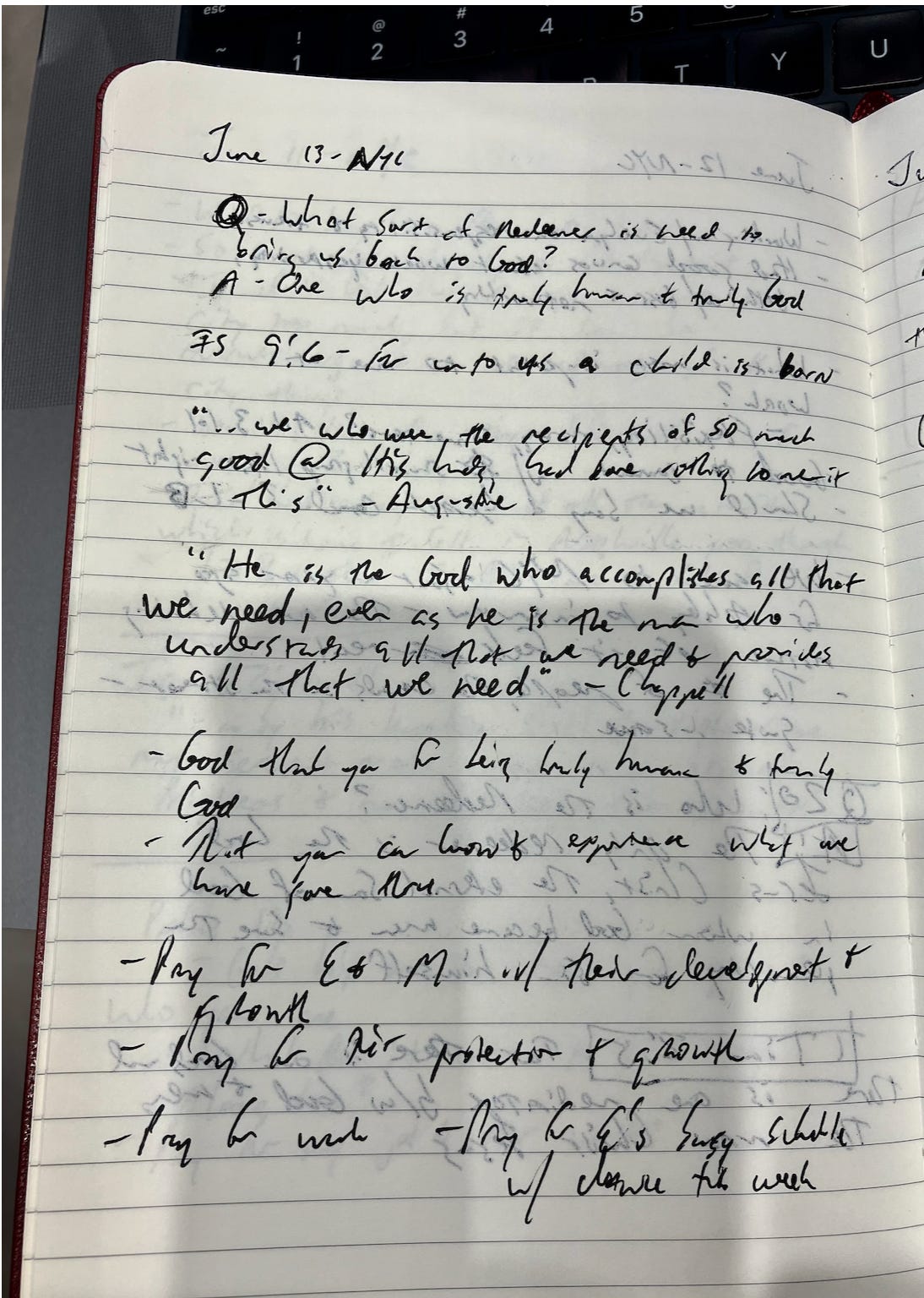how i journal now
I regularly kept a journal in late high school, college, and my first few years of marriage.
Everything seemed pressing back then.
Big events were happening.
Big decisions were being made.
Here’s why I stopped…
But then I fell out of the practice.
I stopped journaling because I felt like I didn’t have anything important to say anymore.
That’s not fully true.
If I look back at a few of my old journals, I tailed off when I had children. I had lots of thoughts, too many really, but no time to jot them down.
In retrospect, it probably would have been a huge help. But surviving was more important than recording.
Here’s why it was hard to get going again…
It was hard to get going again, mainly because of the time element. Now I had a family, and I had fallen out of practice.
It seemed like too big of a lift to do my old style.
I had always written huge paragraphs of text, analyzing feelings and actions. Doing that again seemed too daunting.
The mistake in my old way of journaling…
My old way of journaling involved long paragraphs of prose, like I was writing the definitive history of my life, which is true, that’s what a diary or journal is.
This was my mistake:
I overvalued my personal life experiences. I thought what I was going through was the most important thing in the world.
And in some ways it is, right? That’s the idea of “sonder” — that we’re each the star of our own story, and we over-inflate our own value.
Sonder is when we realize that exists in others.
But in my journaling, there was no humility, only pride.
I’m not that important, but I thought I was.
This isn’t new — we all do this and perceive ourselves as more important than we actually are.
Because I had these grand expectations for my own life, and when I failed to live up to them, I didn’t want to document that. I didn’t want to journal about how I wasn’t making it, even though I was making it just fine, like everyone else was making it.
I thought I didn’t have anything important to say.
That was probably true even when I was actively journaling, I just didn’t want to admit to it.
I overvalued my own importance in the world, set high expectations for myself, and then felt embarrassed when I didn’t achieve my own particular set of expectations.
I didn’t want to document that.
And so I didn’t.
Here’s my Moleskine at my computer. I’m not too particular about Moleskine.
I used to only want blank (unlined) journals, but now I don’t care as much.
I do like the general 5 x 7 size however, to me that’s more of a must.
How I journal now…
I started journaling again at the beginning of this year, but it looks vastly different.
I don’t even think my old self would consider it journaling.
It’s more of bullet points, but not in that super formal bullet journal type of way.
It’s more about quick hits.
Here’s my Moleskine at my computer. I’m not too particular about Moleskine.
I used to only want blank (unlined) journals, but now I don’t care as much.
I do like the general 5 x 7 size however, to me that’s more of a must.
Here’s my current journal structure…
Date and place
Scripture or spiritual affirmation
2–3 things that are top of mind (list form). These often take the form of prayer requests.
Any high emotional points that I was excited about
Any low points that were challenging
One page in journal
In the photo above, you can see the spiritual questions I’m going through, and then 3 things to pray for. It doesn’t fit the above structure perfectly, but it captures what I was thinking about in that moment.
I try and keep tat list above in mind if I feel like I don’t have anything to write about.
TBH, that example isn’t great, because usually my journaling is a bit more personal than that, but it’s a good example for this exercise :)
The Daily Examen…
Sometimes I also turn back to the daily examen which is a traditional Christian reflection practice.
It loosely involves these 5 points (some Christian literature reframes them slightly differently):
Become aware of God’s presence.
Review the day with gratitude.
Pay attention to your emotions.
Choose one feature of the day and pray from it.
Look toward tomorrow.
Feel free to copy this format and use it if you’d like.
Are you currently journaling?
Do you keep a journal or diary? What’s your regular practice look like? How has it changed over time?
I’d love to hear more about it.
Keep going-
Josh Spilker





Josh, thanks for sharing your good work and your process. I appreciate the reminder and reference to the Examen. Almost 20 years ago, I formed my journal habit in response to Julia Cameron's "Morning Pages" prompt. For the most part, my pages more or less recorded stuff that happened the day before. But five years ago, I added an acronym to my practice: S,M/T,I — providing a set of filters to help my recollection process, specifically focusing on recalling three things about yesterday. Here's the key to what I wanted to remember: What S = Surprised, M/T = Moved or Touched, I = Inspired me? Eventually, I added A = Acted on. It's how I'm learning to better navigate my lifestream. Practice helps. And so does encouragement. Thanks again, because you do a great job sharing both these things. Peace, blessings, and all good - Richard R.